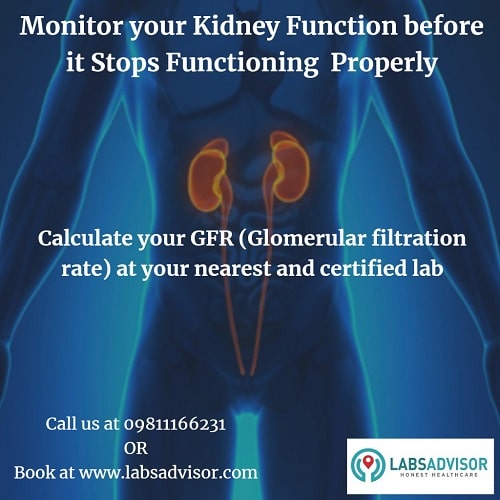
GFR is a blood-based test done to calculate the functioning of the kidneys in a patient’s body. Kidneys basically filter blood to produce wastes of the body including urine and extra fluid. GFR test is often known as the Estimated Glomerular filtration rate (eGFR) Test.
Book this really important test at your local top quality labs through us at up to 50% discount. The lowest GFR kidney test cost in India is ₹314 only.
GFR Test Through LabsAdvisor
|
Book your GFR test online to avail the exclusive offers and cashback!
Here are the simple steps to book your appointment at a discounted price.
- Click on the link given in the below table according to your preferred city.
- Choose the most suitable lab for your GFR test for the kidney.
- Select your preferred date and time for your appointment.
- Enter the patient details and click submit.
- Congratulations! You have booked an appointment at a discounted price.
Book online yourself at any time of the day or night by clicking on the appropriate link in the table below.
GFR / EGFR Test Cost in India & Lab Details
We offer the GFR Test in over 20 Indian cities. Click on the link of your city below to choose a lab and make an online booking for home collection at a suitable time.
| Find GFR Test Cost, Labs & Book Appointment | Price Starting From |
| GFR Test Cost in Delhi | ₹314 |
| GFR Test Cost in Noida | ₹314 |
| GFR Test Cost in Gurgaon | ₹314 |
| GFR Test Cost in Bangalore | ₹360 |
| GFR Test Cost in Chennai | ₹630 |
| GFR Test Cost in Other Indian Cities | ₹314 |
Frequently Asked Questions About GFR Test
What is GFR?
GFR is a blood-based test done to calculate the functioning of the kidneys in a patient’s body. Kidneys basically filter blood to produce wastes of the body including urine and extra fluid.
GFR stands for the Glomerular filtration rate. Glomeruli are the tiny filtration unit in the kidneys that help to remove waste products from the blood. This process prevents the loss of useful components from the blood such as proteins and blood cells. The ratio is somewhat like a healthy pair of kidneys filter about 189 liters of blood and produce approximately 1.9 liters of urine out of it. The GFR value shows the amount of blood that is filtered by the glomeruli per minute. The values are derived on the basis of a particular formula and the present levels of creatinine in the patient’s body (Creatinine is a component of waste products that is eliminated through urination).
If a patient’s kidneys decline to function well, the filtration rate decreases. The waste starts to accumulate in the body and eventually it damages the kidneys.
The glomerular filtration rate (GFR) is basically used to screen for and detect early kidney damage, to help diagnose chronic kidney disease (CKD), and to monitor kidney status. It is a calculation based on the results of a blood creatinine test along with age, sex, and race of the individual.
GFR test is often known as the Estimated Glomerular filtration rate (eGFR) Test.

Who is recommended for a GFR test?
Generally, an eGFR test is suggested for patients who have problems with their kidneys or suffering from chronic kidney disease (CKD). They often show the following signs or symptoms:
- Swollen limbs like legs, ankles, wrist
- Swelling of the abdominal area, thighs, facial features like eyes
- Loss of appetite
- Fatigue or Lethargy (tiredness or laziness)
- Continuous Nausea
- Frequent urination or less urination
- Presence of blood in the urine or foamy urine
- Burning sensation while urinating
- Bad taste in the mouth
- Physical pain where the kidneys are located, i.e mid-back pain
- Body itching
- Hypertension (High-blood pressure)
The patients are at higher risk of chronic kidney disease if they have:
- high blood pressure
- diabetes
- heart problems
- a family history of kidney failure
- obesity
- an addiction to smoking, drinking or drugs
- age above 60 years
- a history of acute kidney injury
GFR Test Procedure?
GFR is a simple and non-invasive blood test. The sample collection process doesn’t take more than 5-10 minutes.
The technician will insert an injection into your vein anywhere in the inner elbow and draw a sample of blood. The blood will be carefully transferred into a sterilized test tube and forwarded for further analysis in the lab.
If you experience excess bruise, swelling, or bleeding from the puncture site, then consult your doctor immediately.
You may be asked to fast overnight or avoid eating meat. As the test is done to evaluate your creatinine levels and meat can temporarily increase the level of creatinine in the blood.
What is the normal reference value of a GFR test?
GFR test is often known as the Estimated Glomerular filtration rate (eGFR) Test.
A normal eGFR is 60 mL/min (one milliliter per minute) OR 1.73 m2 (body surface area). If an eGFR value remains less than 60 after a repeated test then it may indicate bad health of your kidneys. In a worse condition, your doctor may suggest you for dialysis or a kidney transplant if your eGFR value is below 15.
Basically, doctors have categorized Kidney Diseases into 5 stages. And they are:
| Stages | Kidney Damage | ESTIMATED GFR(ML/MIN/ 1.73M2) |
| 1st Stage | Normal or minimal kidney damage with normal GFR | 90+ |
| 2nd Stage | Mild decrease in GFR | 60-89 |
| 3rd Stage | Moderate decrease in GFR | 30-59 |
| 4th Stage | Severe decrease in GFR | 15-29 |
| 5th Stage | Kidney failure | <15 |
This is a standard reference value chart for your GFR test. However, it may vary slightly depending on the procedure used by your labs. A patient’s eGFR must be interpreted on the basis of its clinical history and present conditions.

What are the possible interpretations of a GFR test?
The GFR test results are generally available in a day or two. Consult your concerned doctor to explain your results thoroughly.
The eGFR (Estimated Glomerular filtration rate) test is done to check the status of your kidneys or to monitor chronic kidney disease. It is the most accurate way of measuring the amount of filtered blood in your body.
The results are derived from various formulae on the basis of an individual’s age, sex, race, height, and weight. However, different laboratories may apply a different formula to evaluate the levels. This may lead to different results but your doctor will interpret similar findings through every used formula.
Your result is taken as normal if it is over 60 mL/min/1.73m2. If your doctor detects something abnormal in your results then they may also suggest some other tests to be done on your urine to check for signs of kidney damage. These tests are typically ordered to look for the presence of blood or protein in the urine. They may ask you to get yourself tested repeatedly for 3 months consecutively, till they get satisfied with their findings during your first examination.
A value below 60 mL/min/1.73m2 suggests some sort of kidney dysfunction. They monitored changes to your eGFR also show whether the condition is progressing or not.
Patients with Chronic Kidney Disease can be classified depending on the level of their kidney condition or the amount of protein present in the urine. This information helps to state the stage of Kidney disease and administer the treatment for it.
You can also calculate your GFR Levels by eGFR (Estimated Glomerular filtration rate) Calculator for Kidneys.
What are the limitations of the GFR test?
- The formulas used for the derivation of the results may vary in different labs. However, your doctor may produce similar information for every calculated equation.
- eGFR calculations can be affected by very high or very low muscle mass, muscle injury, a diet very high in meat, hepatic cirrhosis, certain drugs, etc.
- This test is not implemented for everyone. As it is not found in children aged less than 18 years and women who are pregnant.
- Often people suffering from unstable creatinine concentrations, comorbid conditions (additional diseases), diabetes, neuromuscular disorder, malnutrition, or obese are not suitable for these tests.
- People who are amputees, bodybuilders, vegetarian, or have extreme muscle mass may get influenced results.
- The evaluating of GFR directly is complicated and it requires experienced professionals to get accuracy in the result. It is generally performed in formal hospitals or multi-functional labs.
Other topics you may be interested in:-







If you want us to call you back, click on the link below